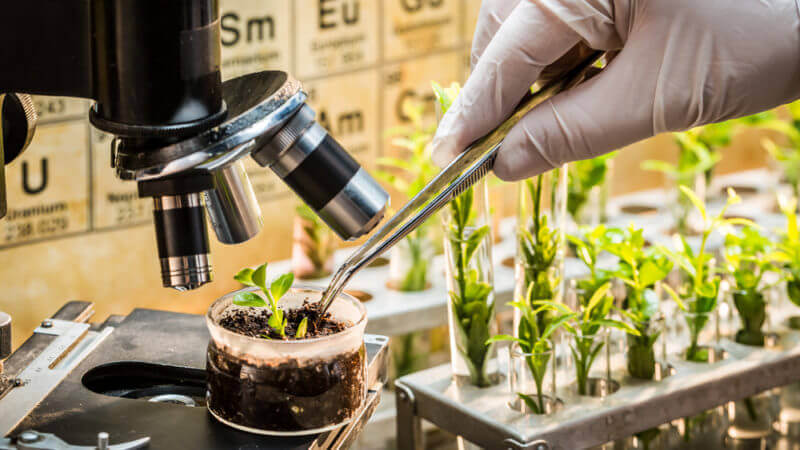
Who we are
The West Africa Centre for Crop Improvement (WACCI) is a partnership between the University of Ghana (UG) and Cornell University, USA that was established in June 2007 with funding from the Alliance for a Green Revolution in Africa (AGRA) at the University of Ghana to train Plant Breeders in Africa working on the improvement of African crops train in local environments for farmers in Africa. The Centre has expanded its scope to train Seed Scientists in Africa.
Vision
To become the foremost Centre for post-graduate training and research in crop improvement in Africa
Mission
We will develop the next generation of plant breeders and seed scientists needed for the transformation of Africa’s Agriculture through high-quality research, teaching and learning

Background
Africa remains food insecure despite numerous measures delineated in several conferences, resolutions, and publications. The number of hungry and malnourished people in Africa, which was about 80 million in the early 1970s, has more than tripled over the past three and a half decades to over 214 million. Persistent low productivity and incomes have hindered access to food. It is estimated that most crops in the region, which feed and clothe the population, are realising only 20% of their yield potential. The region therefore needs to increase crop production to help ensure food security as well as increase income in the agricultural sector. Plant breeding programmes are needed to utilise all available tools to address these problems. However, a major limitation in sub-Saharan Africa is that many indigenous crops, such as sorghum, millet, cassava, yam, plantain, cocoyam, taro, bambara groundnut, and cowpea, are of little or no importance to researchers in the developed world and so have been research-neglected (and are therefore called ‘‘orphan crops’’).
It is against this background, and the existing need to train plant breeders in West and Central Africa, that the West Africa Centre for Crop Improvement (WACCI) was established in 2007 at the University of Ghana, as a parallel Centre to the African Centre for Crop Improvement (ACCI), at the University of Kwazulu-Natal, South Africa that trains African plant breeders on African crops in Africa. The establishment of WACCI is important because the West and Central African sub-region is critically short of plant breeders and most of the crops grown in the region are common to the various countries and relatively unimproved. Moreover, the logistics and cost of travelling between West African countries is relatively low and the region has a common culture, which is different from those of East and Southern Africa. Therefore, unique solutions will be required because the limits and constraints of operating a similar Centre in Ghana are different from those faced in South Africa. WACCI’s Plant Breeding Programme aims to produce skilled, knowledgeable, and well-resourced breeders capable of breeding locally important crops to meet local needs and preferences.
The Centre in 2015 expanded its scope to include an MPhil in Seed Science and Technology. This is in response to the growing need for experts and professionals and a well- structured seed industry in the West African sub-region in 2015 under the World Bank-ACE Project, WACCI in collaboration with the Seed Science Centre at Iowa State University, USA launched an innovative Master of Philosophy (MPhil) programme in Seed Science and Technology aimed at addressing the challenges facing the seed sector in Africa. The programme offers interdisciplinary training that emphasises the development of superior problem- solving and analytical skills by providing students with current seed science and technology instruction along with essential modules in business management in a rigorous, integrated curriculum to develop a network of broadly trained individuals that can work effectively to improve access to high quality seeds.
WACCI is guided by core values which underpin our operations towards achieving our objectives
Excellence
WACCI will strive for excellence in all its endeavours comprising the conduct and administration of our research and teaching programmes.
Integrity
WACCI will demand the highest standards of ethical and professional conduct from all our members.
Commitment to People
Our people are our greatest asset. The WACCI community is composed of scientists, students, staff and administrators who are talented, loyal and committed to the continued success of the organisation. Building on the diversity of people and their scientific talents is key to achieving WACCI’s vision.
Culture of Mentoring
Nurturing the next generation of scientific leaders and workforce, as well as training in critical plant breeding are integral components of our scientific programmes of excellence.
Accountability
The Centre owes it to both its donors and the small holder farmers, to ensure that each dollar invested in a plant breeder goes into producing scientists that would spark an African Green Revolution.
Shared Governance
The Centre comprise scientists, administrators and technicians each of whom provides a perspective to be considered during the process of setting future directions and making decisions.
